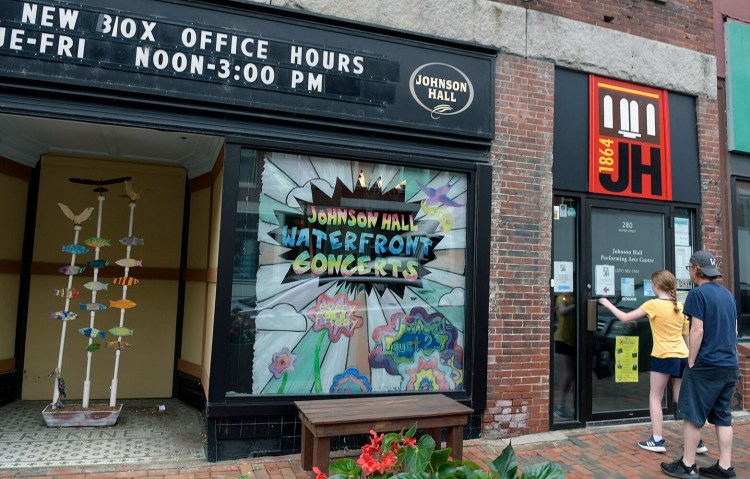GARDINER — When Mike Miclon looks at the white board in his office and sees 71%, he’s pretty happy.
“To be able to see that, it’s incredible,” Miclon, the artistic executive director of the Johnson Hall Performing Arts Center, said earlier this week.

Mike Miclon, artistic executive director of Johnson Hall, walks behind the performing arts center Wednesday in Gardiner. Johnson Hall received a Northern Border Regional Commission grant, in collaboration with City of Gardiner, to renovate the Mechanic Street side of the building and improve its infrastructure. Kennebec Journal photo by Andy Molloy
This week, the historic opera house on Water Street received confirmation that it secured a grant for $387,092 from the Northern Border Regional Commission.
The grant will pay for projects that will make the theater fully accessible, with improvements to Mechanic Street and an elevator and stage level load-in from the street.
And it brings fundraising for the renovation of Johnson Hall and its 400-seat theater closer to its goal of $4.9 million.
“For us as an organization, the significance of this is huge,” Miclon said. “It’s a lot of firsts. It’s our first federal grant we’ve ever received. It is the largest grant Johnson Hall has ever received, and it pushes us to 71% of goal, which is to me one of the most important pieces of information.”
Nearly three years ago, Johnson Hall launched its capital campaign with an announcement of support by Kennebec Savings, in the form of a $100,000 donation, a commitment to purchase all the historic tax credits the project qualifies for and construction financing and pledge financing packages.
While other gifts have been announced since then, the fundraising campaign has been in its quiet phase, which is generally the period during which most of the work associated with raising money is completed, including reaching out to possible major donors and securing commitments from them.
The public phase, which follows the quiet phase, is when the fundraising becomes more visible and includes a variety of appeals like selling names on seats.
“That’s when everyone can come in and participate in the project at whatever level they can afford,” Miclon said.
In March, officials from Johnson Hall approached the Gardiner City Council with a proposal to collaborate on a grant request for infrastructure work that promotes economic development, and elected officials endorsed the move. The final application was submitted in May.

Dennis Price leads children through an acting class at Johnson Hall in Gardiner on Wednesday. Johnson Hall received a Northern Border Regional Commission grant, in collaboration with City of Gardiner, to renovate the Mechanic Street side of the building and improve its infrastructure. Kennebec Journal photo by Andy Molloy
The benefit is two-fold. The theater’s portion would go to creating street-level access from Mechanic Street to the stage in the upper theater, and would make the facility fully compliant with the requirements of the Americans with Disabilities Act. The city’s portion will pay for work on Mechanic Street, including creating additional parking and making improvements to the sidewalk outside Johnson Hall and at the top of Johnson Hall Park.
Tony LaPlante, Gardiner public works director, said the timing of the street work is expected to be planned in coordination with work on the theater.
“We have to do some engineering to see if everything fits,” LaPlante said.
What’s being contemplated is removing a bump out to straighten the street; restricting parking to diagonal, head-in spaces on one side of the road; and maintaining it as a one-way street, he said.
“It’s going to be another positive impact for our downtown,” he said.
The Northern Border Regional Commission is a federal-state partnership for economic and community development for northern Maine, New Hampshire, Vermont and New York.
Andrea Smith, Maine’s program manager for the NRBC at the Maine Department of Economic and Community Development, said the commission looks at several factors in making award decisions, including matching funds and readiness to complete as well as economic impact and infrastructure improvement.
“Some of what’s needed to be done is street work,” Smith said. “But the project is also economically driven. It will draw people to the area and allow businesses to locate or expand there.”
Because it’s a grant, a local match is required. Johnson Hall’s match exists in funds already raised. The city is expected to be labor, so no new tax dollars would be spent on the project.
Johnson Hall dates back to 1864, when hotel owner Benjamin Johnson converted his livery stable into a performance hall. By 1888, the space had been transformed into the Opera House, which drew traveling theater performances and, later, movies.
Currently, Johnson Hall hosts more than 50 shows a season in the Studio Theater on the ground floor, which can accommodate about 100 people. In addition, Johnson Hall, with the support of corporate sponsors, also puts on the free summer concert series Fridays in Waterfront Park.
Send questions/comments to the editors.



Success. Please wait for the page to reload. If the page does not reload within 5 seconds, please refresh the page.
Enter your email and password to access comments.
Hi, to comment on stories you must . This profile is in addition to your subscription and website login.
Already have a commenting profile? .
Invalid username/password.
Please check your email to confirm and complete your registration.
Only subscribers are eligible to post comments. Please subscribe or login first for digital access. Here’s why.
Use the form below to reset your password. When you've submitted your account email, we will send an email with a reset code.